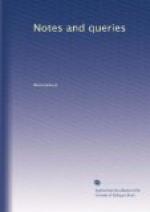He who draws upon a joint-stock bank of literature as rich as yours, Mr. Editor, already is, should bring a something to its capital, though it be a mite. Allow me, then, to throw in mine. At p. 77. “A SUBSCRIBER” asks, “if William de Bolton was an ecclesiastic, how is it that his wife is openly mentioned?” For one of these two reasons: 1st. By the canon law, whether he be in any of the four minor orders, or in any of the three higher or holy orders, a man is, and was always, called “Clericus,” but clerks in lower or minor orders did, and still do, marry without censure; 2d. The Church did, and still does, allow man and wife to separate by free mutual consent, and to bind themselves by the vows of perpetual continence and chastity, the man going into a monastery, or taking holy orders, the woman becoming a nun. Such, I suspect, was the case with Sir William de Bolton ("Sir” being the ancient title of a priest) and his wife, whose joint concurrence in the transfer of property by charter would be legally required, if, as is likely, she had an interest in it.
Your correspondent “MUSAFIR,” while on the subject of the Flemish account, p. 74., is in error, in assigning to a Count of Flanders the “old story” of the cloaks; it belongs to Robert, Duke of Normandy, who played off the joke at Constantinople in the court of the Greek emperor, as Bromton tells us (ed. Twysden, i. 911.)
CEPHAS
* * * * *
THE POETS.
Many years ago a Sonnet, by Leigh Hunt, characterising the poets, appeared in the Examiner. Can any of your readers inform me whether the following, which I quote from memory, is correct?
C. DAY.
“Were I to name, out of the times
gone by,
The poets dearest to me, I
should say,
Pulci for spirits, and a fine,
free way,
Chaucer for manners, and a close, silent
eye;
Spenser for luxury and sweet
sylvan play,
Horace for chatting with from
day to day;
Milton for classic taste and harp strung
high,
Shakspeare for all—but most,
society.
But which take with me could
I take but one?
Shakspeare, as long as I was unoppress’d
With the world’s weight,
making sad thoughts intenser;
But did I wish out of the
common sun
To lay a wounded heart in leafy rest,
And dream of things far off
and healing—Spenser.”
* * * * *
MR. POORE’S LITERARY COLLECTIONS—INIGO JONES—MEDAL OF STUKELEY—SIR JAMES THORNHILL.
Sir,—With thanks for the insertion of my former letter, I proceed to submit a few literary queries for solution through the medium of your pages.




